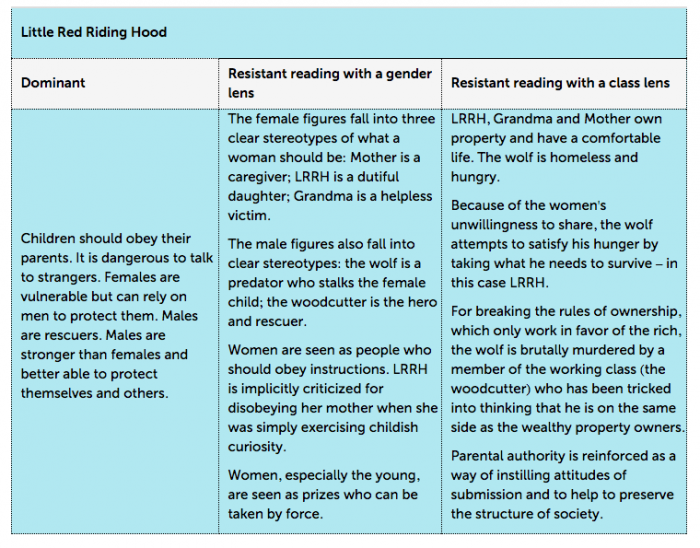In his article "What is Critical Literacy?" Ira Shor reflects that critical literacy is "words rethinking worlds, self dissenting in society," bridging "the political and the personal, the public and the private, the global and the local, the economic and the pedagogical" (282) so that a truly just society may come to pass, where none are oppressed or silenced.
Shor encourages educators in particular to teach critically -- not just for their students' well-being, but out of mutuality, a shared effort to break away from the injustices of society and work toward bettering it as a whole (291). This means, then, that the lessons and materials we share with our students have implications, for better or worse. "Every educator [...] orients students towards certain values, actions, and language with implications for the kind of society and people these behaviors will produce (Shor 300).
As a future ELA teacher, these words, of course, have me thinking: what kind of activity or lessons can I invite students to participate in that emboldens students to begin peeling back the layers of their communities, homes, and selves, that helps us all?
I stumbled (aha, more like sorted out of the wires of Google) across the idea of resistant perspective reading on a blog called Subversive English Teacher in a post by Tina Benson, a 5-12 ELA teacher. Resistant perspective reading is just what it sounds like: students question what they read. Benson writes, "When students are taught to read critically, they look at not only who is speaking but also how they are speaking. Is one group or ideology the focus of the article or do the cultures and values of the reader create multiple meanings? Whose voice is being heard and why?"
After a little more research into resistant perspective reading, I found an activity on the Teaching Tolerance website (it's free to sign up!) called "Hacking as Critical Literacy." The educator who shared the activity, Annie Huynh, shared her experience "hacking" a text, as students would. I encourage you to check it out, but in the mean time, the activity looks like this:
 (Image Source: "Reading Against the Grain")
(Image Source: "Reading Against the Grain")
Shor encourages educators in particular to teach critically -- not just for their students' well-being, but out of mutuality, a shared effort to break away from the injustices of society and work toward bettering it as a whole (291). This means, then, that the lessons and materials we share with our students have implications, for better or worse. "Every educator [...] orients students towards certain values, actions, and language with implications for the kind of society and people these behaviors will produce (Shor 300).
As a future ELA teacher, these words, of course, have me thinking: what kind of activity or lessons can I invite students to participate in that emboldens students to begin peeling back the layers of their communities, homes, and selves, that helps us all?
I stumbled (aha, more like sorted out of the wires of Google) across the idea of resistant perspective reading on a blog called Subversive English Teacher in a post by Tina Benson, a 5-12 ELA teacher. Resistant perspective reading is just what it sounds like: students question what they read. Benson writes, "When students are taught to read critically, they look at not only who is speaking but also how they are speaking. Is one group or ideology the focus of the article or do the cultures and values of the reader create multiple meanings? Whose voice is being heard and why?"
After a little more research into resistant perspective reading, I found an activity on the Teaching Tolerance website (it's free to sign up!) called "Hacking as Critical Literacy." The educator who shared the activity, Annie Huynh, shared her experience "hacking" a text, as students would. I encourage you to check it out, but in the mean time, the activity looks like this:
- Split students into small groups (probably 3-5)
- Allow them to pick a text to "hack" or "remix" (for Huynh and her colleagues, the texts were children's books and fairy tales. You can also pick from books students have previously read, media/advertising images, CD/album covers for popular artists/groups/bands, and so on... there are a lot of possibilities here)
- Give each group markers, glue, construction paper, magazines, folders, et cetera... creative materials for them to produce a new, remixed text
- Have students ponder this question as they flip through their texts:
- What explicit and hidden messages about appearance/race/gender/(dis)ability/sexual orientation/class do authors and illustrators of chosen texts send to readers?
The goal is for students to look critically at these texts, some of which they've grown up with and never questioned, and in consideration of the question posed to them, "hack" the text and come up with their own version that addresses these issues. In this version they would create likely a collage of sorts illustrating their new text, but there are so many options to choose from. Here's an image example of a chart a student might come up with:
 (Image Source: "Reading Against the Grain")
(Image Source: "Reading Against the Grain")
I like your idea for the group wor. Int really allows for students to have voice and choice in their work. The picture you give of the break down of Little Red Riding Hood was a great resource and example. I enjoyed reading it.
ReplyDelete